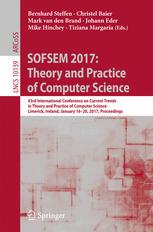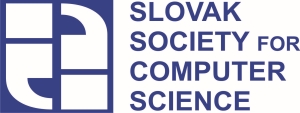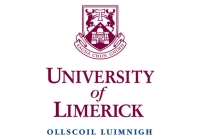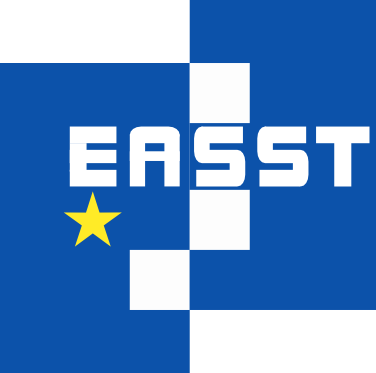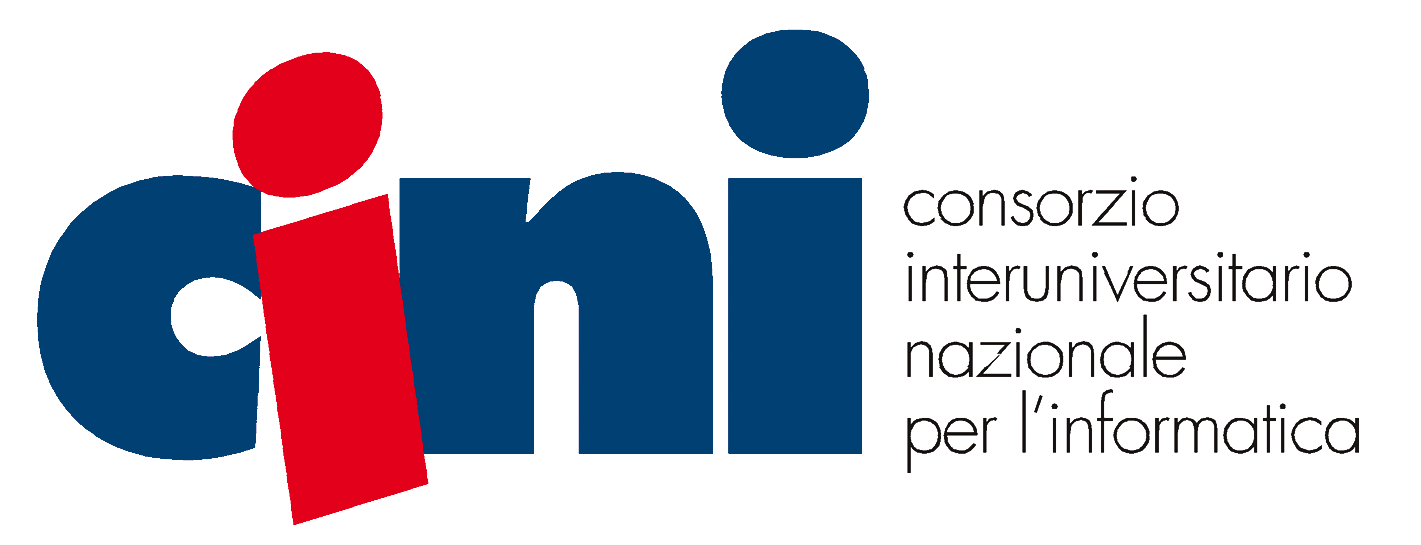SOFSEM 2017 := Tracks & Topics
SOFSEM 2017 will consist of three tracks covering major subareas of current computer science: the traditional track on Foundations of Computer Science and two tracks devoted to leading developments in areas – Software Engineering: Methods, Tools, Applications, and Data, Information and Knowledge Engineering. Original contributions are solicited, presenting new research results in the theory and practice of computer science in each subarea designated for SOFSEM 2017. Each track has its own program chair and program committee, for peer reviewing and feedback to authors. Please consider the appropriate track of SOFSEM 2017 and join the pleasant and stimulating atmosphere of SOFSEM.
SOFSEM 2017 tracks:
Foundations of Computer Science
The track is devoted to the theoretical heart of computer science, covering many different fields. Contributions are distinguished by an emphasis on mathematical background techniques, often with significant impact on practical applications. In other words, contributions that illustrate the value of fundamental research for applications are especially welcome. Such contributions have traditionally received a lot of attention at SOFSEM conferences, since its birth in 1974.
Topics include, but are not limited to:
- algorithms and data structures, including approximation, sequential, distributed, parallel, online, randomized, or graph algorithms,
- automata and formal languages, including grammars and rewriting as well as weighted, timed and probabilistic automata,
- complexity theory, including computational, descriptional, and parametrized,
- computational game theory,
- decidability and undecidability questions,
- discrete mathematics related to computer science,
- foundations of the quantitative analysis of timed, hybrid and stochastic systems
- logic in computer science,
- quantum and bio-inspired computing,
- semantics of progammaning languages,
- theory of concurrent and mobile processes
- verification, model checking, theorem proving, static analysis.
|
Track Program Committee:
- Alessandro Abate (Oxford, United Kingdom
 ) )
- Andreas Abel (Göteborg, Sweden
 ) )
- Erika Abraham (Aachen, Germany
 ) )
- Christel Baier (Dresden, Germany
 ) )
- Armin Biere (Linz, Austria
 ) )
- Hans L. Bodlaender (Utrecht, The Netherlands
 ) )
- Patricia Bouyer (Cachan, France
 ) )
- Gerth Stølting Brodal (Aarhus, Denmark
 ) )
- Sergio Cabello (Ljubljana, Slovenia
 ) )
- Pedro R. D'Argenio (Córdoba, Argentina
 ) )
- Yuxin Deng (Shanghai, China
 ) )
- Uli Fahrenberg (Rennes, France
 ) )
- Juraj Hromkovic (Zürich, Switzerland
 ) )
- Kazuo Iwama (Kyoto, Japan
 ) )
- Rolf Klein (Bonn, Germany
 ) )
- Jan Křetínský (Munich, Germany
 ) )
- Rastislav Královič (Bratislava, Slovakia
 ) )
- Antonín Kučera (Brno, Czech Republic
 ) )
- Barbara König (Duisburg-Essen, Germany
 ) )
- Kamiński Marcin (Warsaw, Poland
 ) )
- Elvira Mayordomo (Zaragoza, Spain
 ) )
- Anca Muscholl (Bordeaux, France
 ) )
- Andrei Popescu (London, United Kingdom
 ) )
- Tomasz Radzik (London, United Kingdom
 ) )
- Alexandra Silva (London, United Kingdom
 ) )
- Jiri Srba (Aalborg, Denmark
 ) )
|
Software Engineering: Methods, Tools, Applications
The track is devoted to the research of novel and innovative methods and technologies to software engineering, including both software product and development process aspects. As software is the source of most of the innovations nowadays, novel software engineering approaches to develop intelligent technical systems, mobile systems, web-based systems, or games of high quality are of great interest. Furthermore, efficient, effective, and agile process approaches for core activities within requirements elicitation and software development are requested, as well as approaches for integrating business aspects, software development aspects, and software operations aspects (BizDevOps). In particular, lean and agile principles on the process site and component- and service-oriented concepts of the product site are of interest.
Topics include, but are not limited to:
- lean/agile development,
- user-centered development,
- (situational) method engineering,
- development/operations (DevOps),
- architecture, components, services,
- (dynamic) product lines,
- model-based development,
- model transformations,
- model mining techniques,
- model and meta-model co-evolution,
- model-based testing,
- model versioning,
- legacy modernization/migration,
- repository mining,
- software engineering for
- process-centered information systems,
- intelligent technical systems (Internet of Things),
- mobile systems,
- web-based systems,
- game development,
- software safety and reliability,
- tools and development environments.
|
Track Program Committee:
- Gregor Engels (Paderborn, Germany
 ) )
- Bernd Fischer (Stellenbosch, South Africa
 ) )
- Tibor Gyimothy (Szeged, Hungary
 ) )
- Görel Hedin (Lund, Sweden
 ) )
- Zoltán Horváth (Budapest, Hungary
 ) )
- Pierre-Etienne Moreau (Nancy, France
 ) )
- Claus Pahl (Dublin, Ireland
 ) )
- Alfonso Pierantonio (L'Aquila, Italy
 ) )
- Ina Schäfer (Braunschweig, Germany
 ) )
- Bran Selic (Oslo, Norway
 ) )
- Miroslaw Staron (Gothenburg, Sweden
 ) )
- Krzysztof Stencel (Warsaw, Poland
 ) )
- Emma Söderberg (Copenhagen, Google, Denmark
 ) )
- Bogdan Vasilescu (Davis, USA
 ) )
- Marina Waldén (Turku, Finland
 ) )
- Mark van den Brand (Eindhoven, The Netherlands
 ) )
|
Data, Information and Knowledge Engineering
The track is devoted to all aspects of eliciting, acquiring, modeling, storing, and managing data, information, and knowledge. Contributions concerning all steps in the development of data and knowledge-intensive systems – theoretical foundations, design, implementation and maintenance techniques – are welcome.
Topics include, but are not limited to:
- Big Data storage, processing and analytics,
- business process modeling, automation, and management
- data and information modeling,
- data and information semantics,
- data integration, data cleaning,
- data intensive applications,
- data warehousing,
- data mining, knowledge discovery and machine learning,
- data privacy and security,
- information retrieval,
- intelligent agents, multi-agent systems,
- knowledge modeling and processing,
- knowledge acquisition and engineering,
- linked data and open data,
- mobile data and information,
- multimedia, spatial, and temporal data and knowledge,
- parallel and distributed data platforms
- probabilistic databases, uncertainty and approximate querying,
- query and natural language processing,
- provenance and trust in data management and knowledge engineering,
- stream data management,
- web and semantic web data and knowledge engineering.
|
Track Program Committee:
- Ladjel Bellatreche (Poitiers, France
 ) )
- Mária Bieliková (Bratislava, Slovakia
 ) )
- Barbara Catania (Genova, Italy
 ) )
- Johann Eder (Klagenfurt, Austria
 ) )
- Uwe Egly (Wien, Austria
 ) )
- Johann Gamper (Bolzano, Italy
 ) )
- Theo Härder (Kaiserslautern, Germany
 ) )
- Mirjana Ivanovic (Novi Sad, Serbia
 ) )
- Georgia Koutrika (Palo Alto, USA
 ) )
- Stanislav Krajči (Košice, Slovakia
 ) )
- Yannis Manolopoulos (Thessaloniki, Greece
 ) )
- Rainer Manthey (Bonn, Germany
 ) )
- Morzy Tadeusz (Poznan, Poland
 ) )
|
 ).
). ).
). ).
).
 )
) )
) )
) )
) )
) )
) )
) )
) )
) )
) )
) )
) )
) )
) )
) )
) )
) )
) )
) )
) )
) )
)